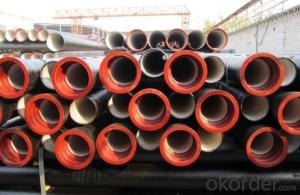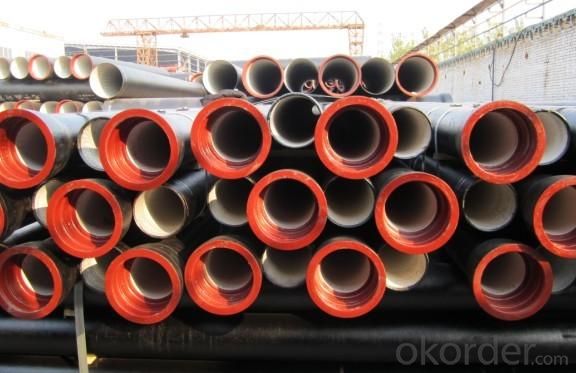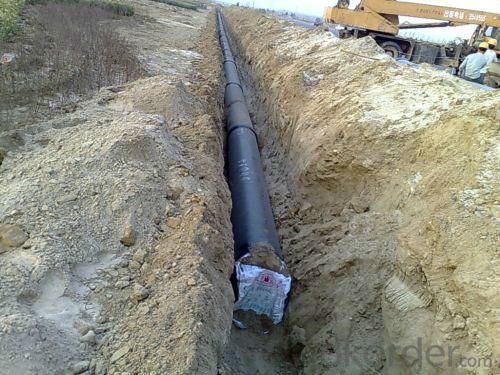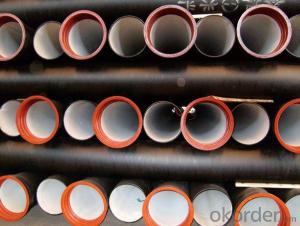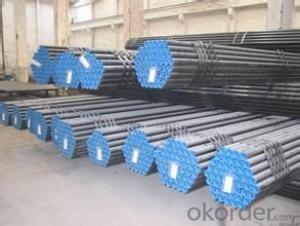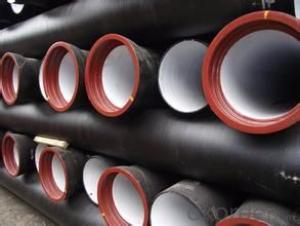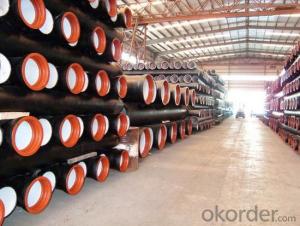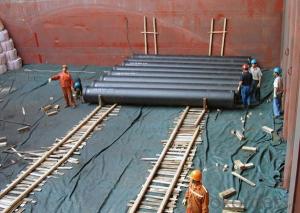Ductile Iron C-Class Flange type Length: 6M/Negotiated
- Loading Port:
- China main port
- Payment Terms:
- TT OR LC
- Min Order Qty:
- 500 m
- Supply Capability:
- 100000 m/month
OKorder Service Pledge
OKorder Financial Service
You Might Also Like
1.Ductile Iron Pipe Description :
1) Pipes confirm to ISO2531,K9 class,T type joint,6m long,with inside cements lining conform to ISO4179, outside Zinc
spraying(130g/m2) and bitumen coating(70μm) conform to ISO8179.
2) Pipe ends: Spigot and socket ends, with 100% SBR rubber gaskets accoding to ISO4633
3) we can do third party inspection according to customer's request.
4) Our products have been sold to many international market, such as Middle East and South East Asia and Africa.
2.Main Features of the Ductile Iron Pipe:
1).Quality guarantee
• Chemical checking
• NDE after rough machining
• Mechanical testing after heat treatment
• Final NDE,dimension inspected
2).Quality document
• Full Q.A document as per client request
3).Packing and Shipping
• standard export package(carton/wooden case/pallet)
• accept FOB,FAS,CNF,CIF door to door etc or customer designated shipping agent
4).Service
• Drawing: we can translate your original drawing, offer best suggestion on design
• Quality: we have full set quality control system to guarantee the best quality.
• Inspection: inspect in house, all our products must be checked 3 times before packing
3.Ductile Iron Pipe Images:
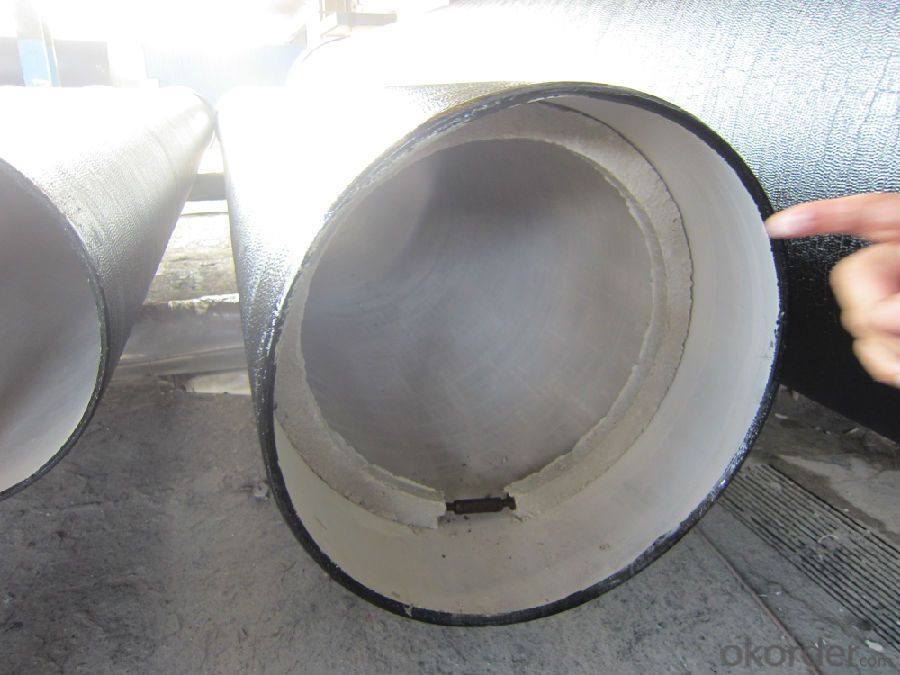
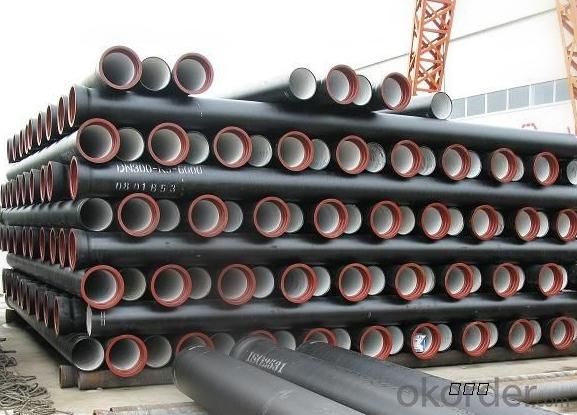
4.Ductile Iron Pipe Specification:
Surface Finishes: Bare, Oiled, Mill Varnish, Galv,FBE, FBE Dual, 3LPE, 3LPP, Coal Tar,Concrete Coating and Tape Wrap
End Finishes: Beveled, Square Cut, Threaded, hat
Additional Services: Internal Coating
Packaging: packed in bag, plastic bag, steel strip, steel wire,double wire, iron box, wooden box, tarpaulin, plastic sheeting
Inspection: MOODY SGS BV GL DNV ABS LIOYD’S
Test: X-ray, UT, magnetic particle,inspection,hydrostatic test.
Processing service: Beveling, Threading, Slotting, Cut-to length, Bends, Quench and Temper, Fabrication, Double-jointing and On-site assistance
5.FAQ:
We have organized several common questions for our clients,may help you sincerely:
1.Q: Why would you choose ductile iron pipe rather than other pipe materials?
A:The reasons are obvious for that not only ductile iron pipe possesses the inherent strength and flexibility of ductile iron, combined with proven corrosion protection systems, but also the cost savings can be achieved from design to installation and commissioning.
2.Q:Why can you guarantee the inner of pipes can’t be corroded?
A: High alumina cement mortar lining and sulphate-resistant cement mortar lining. These two special linings are applicable to inner anti-corrosion for sewage pipes, improving resistance to erosion of the sewage components.
- Q: Can ductile iron pipes be used in potable water systems?
- Ductile iron pipes are indeed suitable for use in potable water systems. They belong to the cast iron category but possess increased strength and ductility. Their durability, resistance to corrosion, and long lifespan make them a popular choice for water infrastructure, especially potable water systems. These pipes are produced in accordance with specific standards and regulations governing the use of potable water, ensuring the safe transportation of drinking water. Moreover, ductile iron pipes exhibit exceptional flow characteristics, making them well-suited for water distribution systems. All in all, ductile iron pipes are a dependable and frequently employed material in potable water systems.
- Q: Are ductile iron pipes suitable for pressure reducing valve stations?
- Yes, ductile iron pipes are suitable for pressure reducing valve stations. Ductile iron pipes are known for their strength and durability, which makes them an ideal choice for applications involving high pressure. Pressure reducing valve stations are designed to regulate and reduce the pressure of a fluid or gas in a pipeline system. Ductile iron pipes can handle the pressure exerted by the fluid or gas, ensuring a reliable and efficient operation of the pressure reducing valve station. Additionally, ductile iron pipes have excellent resistance to corrosion, which is crucial in maintaining the integrity of the pipeline system and preventing leaks or failures. Overall, ductile iron pipes provide the necessary strength, durability, and corrosion resistance required for pressure reducing valve stations.
- Q: What are the recommended bedding and backfill materials for ductile iron pipe?
- The recommended bedding and backfill materials for ductile iron pipe include a combination of granular materials such as sand, gravel, or crushed stone. These materials provide support and stability to the pipe, ensuring proper alignment and preventing damage during installation and operation. For bedding, a layer of sand is typically used to create a uniform and level surface for the pipe to rest on. This helps distribute the load evenly along the pipe's length and reduces the potential for stress concentration. Backfill material is used to fill the remaining space around the pipe once it is properly bedded. It is crucial to select a material that offers good compaction and drainage properties to prevent settling and potential damage to the pipe. Commonly used backfill materials include crushed stone or gravel, which provide stability and allow for proper compaction. It is important to follow the recommendations of the pipe manufacturer and any relevant industry standards when selecting bedding and backfill materials for ductile iron pipe. These materials should meet the specified size and quality requirements to ensure the long-term performance and durability of the pipe system. Additionally, local regulations and soil conditions should also be taken into consideration when determining the appropriate bedding and backfill materials for ductile iron pipe installations.
- Q: Can ductile iron pipes be used for potable water systems?
- Yes, ductile iron pipes can be used for potable water systems. Ductile iron is a strong and durable material that is resistant to corrosion and has been widely used in water distribution systems for many years. It meets the necessary standards and regulations for the transportation of potable water, making it a suitable choice for such applications.
- Q: Are ductile iron pipes suitable for irrigation canal systems?
- Yes, ductile iron pipes are suitable for irrigation canal systems. Ductile iron pipes have high strength and durability, making them resistant to external loads and pressure variations common in irrigation systems. They also have excellent corrosion resistance, ensuring a long lifespan and minimizing maintenance needs. Additionally, ductile iron pipes have smooth interiors, reducing friction and allowing for efficient water flow, which is crucial for irrigation canal systems.
- Q: What is the difference between a cast iron pipe and a ductile iron pipe?
- Nodular cast iron has high strength and strong plasticity. The tensile strength of ductile iron is twice that of gray iron, and the yield strength even exceeds that of cast steel.
- Q: Can ductile iron pipes be used in dam or reservoir projects?
- Ductile iron pipes are highly suitable for dam or reservoir projects. Their strength, durability, and resistance to corrosion are well-known, making them a preferred choice for a range of applications, such as water distribution and transmission systems. In projects involving dams or reservoirs, where the pipes must endure high pressure and transport large volumes of water, ductile iron pipes are often the top choice. Their exceptional mechanical properties, including impressive tensile strength and impact resistance, guarantee their ability to handle the load and offer a dependable and long-lasting solution. Moreover, ductile iron pipes can easily adapt to various installation methods, including trenchless techniques, making them a versatile option for dam or reservoir projects.
- Q: What is ductile iron?
- Ductile iron, after being treated with either magnesium or cerium, undergoes an improvement in its mechanical properties. This particular type of cast iron earns the name "ductile" due to its higher degree of ductility in comparison to other cast iron varieties. Ductility pertains to a material's capacity to stretch or deform without breaking. This quality renders ductile iron particularly ideal for applications that demand both high strength and resistance to wear and tear, such as pipes, automotive components, and machinery parts. The inclusion of magnesium or cerium during the manufacturing process aids in the formation of graphite within the iron's structure, contributing to its distinctive properties. This graphite formation serves to enhance the iron's flexibility and reduce its brittleness, enabling it to absorb shock and vibrations without fracturing. As a whole, ductile iron presents a fine balance between the strength of cast iron and the flexibility of steel, thereby establishing itself as a versatile material well-suited for diverse industrial applications.
- Q: Can ductile iron pipes be used for underground chemical processing systems?
- Due to their limited resistance to corrosion from various chemicals, ductile iron pipes are generally not recommended for use in underground chemical processing systems. Despite being known for their strength, durability, and flexibility, ductile iron pipes can still corrode when exposed to certain chemicals, especially those with high acidity or alkalinity. The use of ductile iron pipes in underground chemical processing systems poses a higher risk of exposure to corrosive substances that can gradually deteriorate the pipes. This deterioration can result in leaks, cracks, and failures in the piping system, compromising its integrity and potentially creating hazardous conditions. To mitigate this risk, it is advisable to consider alternative materials that offer greater resistance to corrosion in underground chemical processing systems. Stainless steel, PVC, and high-density polyethylene (HDPE) pipes are examples of materials that provide superior chemical resistance and can withstand the harsh conditions typically found in chemical processing environments. To determine the most suitable materials for underground chemical processing systems, it is essential to consult experts in chemical engineering, piping design, and corrosion resistance. The proper selection of materials is crucial for ensuring the longevity and safety of the piping infrastructure in such environments.
- Q: Can ductile iron pipe be used in corrosive environments?
- Ductile iron pipe is capable of being utilized in environments that are corrosive. Ductile iron is renowned for its ability to withstand corrosion and has been extensively employed in diverse applications where resistance to corrosion is necessary. The resistance of ductile iron to corrosion is attributed to the formation of a natural protective oxide layer on its surface, which acts as a barrier against corrosive substances. Furthermore, ductile iron pipes can be coated with different protective coatings such as polyethylene or epoxy to augment their resistance to corrosion. These coatings furnish an additional layer of protection, rendering ductile iron pipes appropriate for deployment in highly corrosive settings like wastewater treatment plants, industrial plants, and marine applications. Nevertheless, it is crucial to take into account the specific corrosive substances present in the environment and seek guidance from experts or adhere to industry standards to guarantee the proper implementation of coating and maintenance practices for long-term performance and durability.
Send your message to us
Ductile Iron C-Class Flange type Length: 6M/Negotiated
- Loading Port:
- China main port
- Payment Terms:
- TT OR LC
- Min Order Qty:
- 500 m
- Supply Capability:
- 100000 m/month
OKorder Service Pledge
OKorder Financial Service
Similar products
Hot products
Hot Searches
Related keywords
